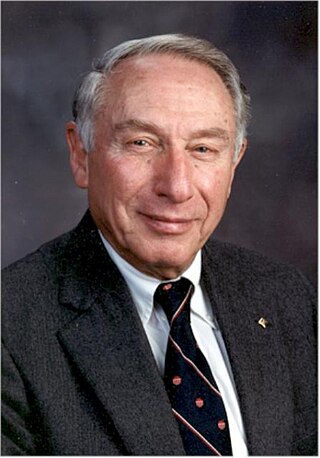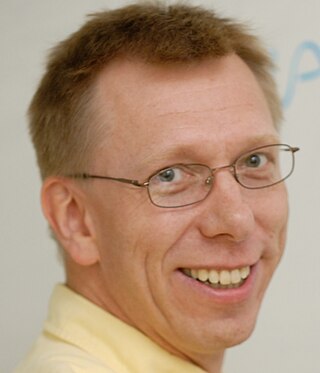Related Research Articles

Gregory Louis Timp is a professor of Electrical Engineering and Biological Sciences at the University of Notre Dame. A graduate of the Massachusetts Institute of Technology, Timp has previously worked at Bell Laboratories and the University of Illinois. He has worked with low temperature transport, nanostructure physics and, since 2000, research at the boundary between biology and nanoelectronics. He is a Fellow of the American Association for the Advancement of Science, the American Physical Society, the Institute of Electrical and Electronics Engineers.
Tobin Jay Marks is an inorganic chemistry Professor, the Vladimir N. Ipatieff Professor of Catalytic Chemistry, Professor of Material Science and Engineering, Professor of Chemical and Biological Engineering, and Professor of Applied Physics at Northwestern University in Evanston, Illinois. Among the themes of his research are synthetic organo-f-element and early-transition metal organometallic chemistry, polymer chemistry, materials chemistry, homogeneous and heterogeneous catalysis, molecule-based photonic materials, superconductivity, metal-organic chemical vapor deposition, and biological aspects of transition metal chemistry.
Ralph G. Nuzzo, born February 23, 1954, in Paterson, New Jersey, is an American chemist and professor. Nuzzo is a researcher in the chemistry of materials, including processes that occur at surfaces and interfaces. His work has led to new techniques for fabricating and manipulating materials at the nano scale level, including functional device structures for microelectronics, optics and chemical sensing.
Eric N. Jacobsen is the Sheldon Emery Professor of Chemistry and former chair of the department of chemistry and chemical biology at Harvard University. He is a prominent figure in the field of organic chemistry and is best known for the development of the Jacobsen epoxidation and other work in selective catalysis.

Floyd Dunn was an American electrical engineer who made contributions to all aspects of the interaction of ultrasound and biological media. Dunn was a member of Scientific Committee 66 of the National Council on Radiation Protection and Measurements as well as many FDA, NIH, AIUM, and ASA committees. He collaborated with scientists in the UK, Japan, China and Post-Soviet states.
M. Christina White is a professor of chemistry at the University of Illinois at Urbana-Champaign. Her research in the field of organometallic catalysis focuses on developing highly selective carbon–hydrogen bond activation methods to streamline the process of complex molecule synthesis.
Taekjip Ha is a South Korean-born American biophysicist who is currently a Bloomberg Distinguished Professor of Biophysics and Biomedical Engineering at Johns Hopkins University. He was previously the Gutgsell Professor of Physics, at University of Illinois at Urbana-Champaign where he was the principal investigator of Single Molecule Nanometry group. He is also a Howard Hughes Medical Institute investigator.
Sharon Hammes-Schiffer is a physical chemist who has contributed to theoretical and computational chemistry. She is currently a Sterling Professor of Chemistry at Yale University. She has served as senior editor and deputy editor of the Journal of Physical Chemistry and advisory editor for Theoretical Chemistry Accounts. As of 1 January 2015 she is editor-in-chief of Chemical Reviews.
William F. Banholzer is an American Professor of Chemical and Biological Engineering at the University of Wisconsin-Madison. Prior to this role, he was formally a chemical engineer and Executive Vice President and Chief Technology Officer at the Dow Chemical Company. He is most known for his leadership of industrial R&D organizations at both Dow Chemical Company and General Electric. He is also known for the discovery of methods related to production of synthetic diamond. In particular, the synthesis methods he developed allowed the production of isotopically pure diamonds.
A Beckman Fellow receives funding, usually via an intermediary institution, from the Arnold and Mabel Beckman Foundation, founded by Arnold Orville Beckman and his wife Mabel. The Foundation supports programs at several institutions to encourage research, particularly the work of young researchers who might not be eligible for other sources of funding. People from a variety of different programs at different institutions may therefore be referred to as Beckman Fellows. Though most often designating postdoctoral awards in science, the exact significance of the term will vary depending on the institution involved and the type(s) of Beckman Fellowship awarded at that institution.
Theodore Lawrence Brown is an American scientist known for research, teaching, and writing in the field of physical inorganic chemistry, a university administrator, and a philosopher of science. In addition to his research publications, Brown has written textbooks on general chemistry and science communication which have been published in multiple languages and used in multiple countries. He is a professor emeritus at the University of Illinois at Urbana-Champaign, where he has also held the administrative positions of vice chancellor for research and dean of the graduate college (1980–1986). He is the founding director emeritus of the Beckman Institute for Advanced Science and Technology.

Nancy Beth Jackson was an American chemist. She did energy research on heterogeneous catalysis and the development of alternative fuels. She also worked in the field of chemical nonproliferation, educating chemical professionals on the importance of safe and secure chemical practice in research, teaching and business, in an effort to prevent the misuse of chemicals as "weapons, poisons, explosives or environmental pollutants". She was the first implementer in developing the international Chemical Security Engagement Program. She was active in promoting diversity in STEM fields. She was president of the American Chemical Society in 2011, leading the organization during the International Year of Chemistry. In 2012, she was honored with the AAAS Award for Science Diplomacy.

Nigel Shaun Scrutton is a British biochemist and biotechnology innovator known for his work on enzyme catalysis, biophysics and synthetic biology. He is Director of the UK Future Biomanufacturing Research Hub, Director of the Fine and Speciality Chemicals Synthetic Biology Research Centre (SYNBIOCHEM), and Co-founder, Director and Chief Scientific Officer of the 'fuels-from-biology' company C3 Biotechnologies Ltd. He is Professor of Enzymology and Biophysical Chemistry in the Department of Chemistry at the University of Manchester. He is former Director of the Manchester Institute of Biotechnology (MIB).
Jonathan V Sweedler is an American chemist specializing in bioanalytical chemistry, neurochemistry and cell to cell biology and behavior. He is the James R. Eiszner Family Endowed Chair in Chemistry at the University of Illinois at Urbana-Champaign. Additionally, he holds a faculty appointment in the Beckman Institute. He is also an Elected Fellow to the American Chemical Society, for which he is also the society's Editor in Chief for the journal Analytical Chemistry.
Kristala Jones Prather is an American professor of Chemical Engineering at the Massachusetts Institute of Technology. Her research is focused on using novel bioprocesses to design recombinant microorganisms to produce small molecules.

Sara E. Skrabalak is a James H. Rudy Professor at Indiana University. Skrabalak leads a research group in the department of chemistry which focuses on the development of new nanomaterials. She has an adjunct appointment in the department of intelligent systems engineering.
Jianjun Cheng is a Chinese material scientist.

Wilfred A. van der Donk is a Dutch–American enzymologist and chemical biologist. He is the Richard E. Heckert Chair in Chemistry at the University of Illinois Urbana-Champaign.
Deborah E. Leckband is an American chemist who is the Reid T. Milner Professor of Chemical Sciences and professor of chemistry at the University of Illinois Urbana-Champaign. She works on biomaterials, tissue engineering and the nano mechanics of biomolecules. She is a Fellow of the American Institute for Medical and Biological Engineering, the American Association for the Advancement of Science, the Biomedical Engineering Society and the American Chemical Society.
Liviu M. Mirica is the Janet and William H. Lycan Professor of Chemistry at the University of Illinois at Urbana-Champaign, known for his work in organometallic chemistry and nickel-based catalysis. He was elected in 2018 as a Fellow of the Royal Society of Chemistry, and in 2022 as a Fellow of the American Association for the Advancement of Science. His research interests include using synthetic, inorganic and organometallic chemistry to study novel transition metal complexes with applications for sustainable catalysis. He has also worked on developing bifunctional diagnostic and therapeutic agents for amyloid-beta-related disorders such as Alzheimer's disease, while continuing to investigate the roles of transition metal ions in neurodegenerative diseases.
References
- ↑ "CAS Fellows Archive". Center for Advanced Study, University of Illinois at Urbana-Champaign. Archived from the original on 30 June 2018. Retrieved 2 August 2018.
- ↑ "Huimin Zhao". John Simon Guggenheim Memorial Foundation. Archived from the original on 5 February 2015. Retrieved 1 September 2012.
- ↑ "AAAS Fellows" (PDF). American Association for the Advancement of Science. Retrieved 18 February 2015.
- ↑ "Huimin Zhao, Ph.D." American Institute for Medical and Biological Engineering. Retrieved 18 February 2015.
- ↑ "ACS Catalysis masthead" (PDF). American Chemical Society. Retrieved 18 February 2015.